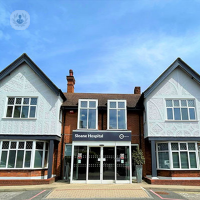What is a hernia?
A hernia appears as a lump, most commonly in the abdominal or groin area. They occur when an organ, often the bowel, protrudes through the cavity which normally contains it.
The most frequent types of hernia are:
- Inguinal hernia (in the abdomen)
- Femoral hernia (in the groin)
- Umbilical hernia (in the belly button)
- Hiatal hernia (in the diaphragm)
- Incisional hernia (through a scar)
What are the symptoms of a hernia?
A swelling or lump is the most typical sign of the presence of a hernia. They can cause pain or discomfort when performing normal daily activities or in physical exercise. Sometimes, in hernias that are still in an early stage, pain is felt even if a swelling is not yet evident.
If you notice any of these symptoms, it is best to consult a specialist to avoid neglecting the hernia and prevent it from increasing in size and causing further problems.
What causes a hernia?
A hernia is mainly caused by a combination of weakness and pressure in a certain muscle band. This pressure causes the organ to be pushed through the opening of the muscle. It can be a congenital weakness or it can be developed over the years.
Other causes that may favour weakness are: excessive exertion such as heavy lifting, diarrhoea or constipation, continuous cough, being overweight, or smoking.
How are hernias treated?
Depending on the hernia and its severity, some can be managed with medication and lifestyle changes. Others, however, may require surgery to fix. Many forms of hernia surgery can be performed minimally invasively.
05-18-2017 10-19-2023Hernia
Mr Antony Pittathankal - Surgery
Created on: 05-18-2017
Updated on: 10-19-2023
Edited by: Carlota Pano
What is a hernia?
A hernia appears as a lump, most commonly in the abdominal or groin area. They occur when an organ, often the bowel, protrudes through the cavity which normally contains it.
The most frequent types of hernia are:
- Inguinal hernia (in the abdomen)
- Femoral hernia (in the groin)
- Umbilical hernia (in the belly button)
- Hiatal hernia (in the diaphragm)
- Incisional hernia (through a scar)
What are the symptoms of a hernia?
A swelling or lump is the most typical sign of the presence of a hernia. They can cause pain or discomfort when performing normal daily activities or in physical exercise. Sometimes, in hernias that are still in an early stage, pain is felt even if a swelling is not yet evident.
If you notice any of these symptoms, it is best to consult a specialist to avoid neglecting the hernia and prevent it from increasing in size and causing further problems.
What causes a hernia?
A hernia is mainly caused by a combination of weakness and pressure in a certain muscle band. This pressure causes the organ to be pushed through the opening of the muscle. It can be a congenital weakness or it can be developed over the years.
Other causes that may favour weakness are: excessive exertion such as heavy lifting, diarrhoea or constipation, continuous cough, being overweight, or smoking.
How are hernias treated?
Depending on the hernia and its severity, some can be managed with medication and lifestyle changes. Others, however, may require surgery to fix. Many forms of hernia surgery can be performed minimally invasively.


Exercising after hernia surgery: what helps and what to avoid
By Mr Himaz Marzook
2024-11-21
If you've just had hernia surgery you may be wondering what happens next, when you can resume daily activities such as work and exercise. Luckily, leading consultant general surgeon Mr Himaz Marzook is on hand to answer these questions and more. See more


Keyhole hernia surgery: Minimally invasive repair for hernias
By Professor Khurshid Akhtar
2024-11-21
Keyhole hernia surgery is a minimally invasive procedure performed using general anaesthetic for the repair of a hernia. Here, Professor Khurshid Akhtar, renowned consultant general and upper GI (gastrointestinal) surgeon, provides an expert insight into keyhole hernia surgery. See more


Understanding abdominal hernias: Types, symptoms, and when to seek medical help
By Mr Vanash Patel
2024-11-21
In his latest online article, Mr Vanash Patel gives us his insights into hernias. He discusses the most common types and how they differ in terms of presentation, risk factors and treatment options, what the most common symptoms are and when to seek medical attention. See more


Epigastric hernia: When is surgery required?
By Mr Filippo Di Franco
2024-11-21
Leading consultant general surgeon Mr Filippo Di Franco gives an expert guide to the symptoms and treatment of epigastric hernias, including when surgery is indicated. See more
Experts in Hernia
-
Mr Ahmed R. Ahmed
SurgeryExpert in:
- Bariatric surgery
- Hernia
- Gallbladder surgery
- Acid reflux
- Diabetes surgery
- Weight loss
-
Mr Sanjay Agrawal
SurgeryExpert in:
- Weight loss injections
- Obesity surgery
- Gastric band
- Bariatric surgery
- Gallstones
- Hernia
-
Mr Krishna Moorthy
SurgeryExpert in:
- Acid reflux
- Bariatric surgery
- Oesophageal cancer
- Gastric cancer surgery
- Hernia
- Laparoscopy
-
Mr Andrew Wan
SurgeryExpert in:
- Obesity
- Bariatric surgery
- Gallstones
- Cholecystectomy
- Hernia
- Acid reflux
-
Mr Ajit Abraham
SurgeryExpert in:
- Gallstones
- Pancreatic cancer
- Liver cancer
- Pancreatitis
- Hernia
- Robotic surgery
- See all

The Sloane Hospital - part of Circle Health Group
The Sloane Hospital - part of Circle Health Group
125 Albemarle Rd, Beckenham BR3 5HS
No existe teléfono en el centro.
By using the telephone number provided by TOP DOCTORS, you automatically agree to let us use your phone number for statistical and commercial purposes. For further information, read our Privacy Policy
Top Doctors

The Highfield Hospital - part of Circle Health Group
The Highfield Hospital - part of Circle Health Group
Manchester Road, Rochdale, Lancashire, OL11 4LZ
No existe teléfono en el centro.
By using the telephone number provided by TOP DOCTORS, you automatically agree to let us use your phone number for statistical and commercial purposes. For further information, read our Privacy Policy
Top Doctors

Shirley Oaks Hospital - part of Circle Health Group
Shirley Oaks Hospital - part of Circle Health Group
Poppy Lane, Croydon CR9 8AB
No existe teléfono en el centro.
By using the telephone number provided by TOP DOCTORS, you automatically agree to let us use your phone number for statistical and commercial purposes. For further information, read our Privacy Policy
Top Doctors
-
The Sloane Hospital - part of Circle Health Group
125 Albemarle Rd, Beckenham BR3 5HS , South LondonExpert in:
- Abdominal ultrasound
- Vascular Surgery
- Cardiology
- Colorectal surgery
- Endocrine Surgery
- General Surgery
-
The Highfield Hospital - part of Circle Health Group
Manchester Road, Rochdale, Lancashire, OL11 4LZ , RochdaleExpert in:
- Cardiology
- Orthopaedic surgery
- Plastic surgery, reconstructive and aesthetics
- Dermatology
- Diagnostic Imaging
- Endocrinology
-
Shirley Oaks Hospital - part of Circle Health Group
Poppy Lane, Croydon CR9 8AB, South LondonExpert in:
- General Surgery
- Orthopaedic surgery
- Plastic surgery, reconstructive and aesthetics
- Gastroenterology
- Obstetrics and Gynaecology
- Neurosurgery
- See all
- Most viewed diseases, medical tests, and treatments
- Undescended testicle (Cryptorchidism)
- Weight loss injections
- Nipple discharge
- Abdominal pain
- Endovenous laser treatment (EVLA)
- Minimal access surgery (keyhole surgery)
- Head and neck cancer
- Neck lump
- Bariatric surgery
- Acellular dermal matrix (ADM)








